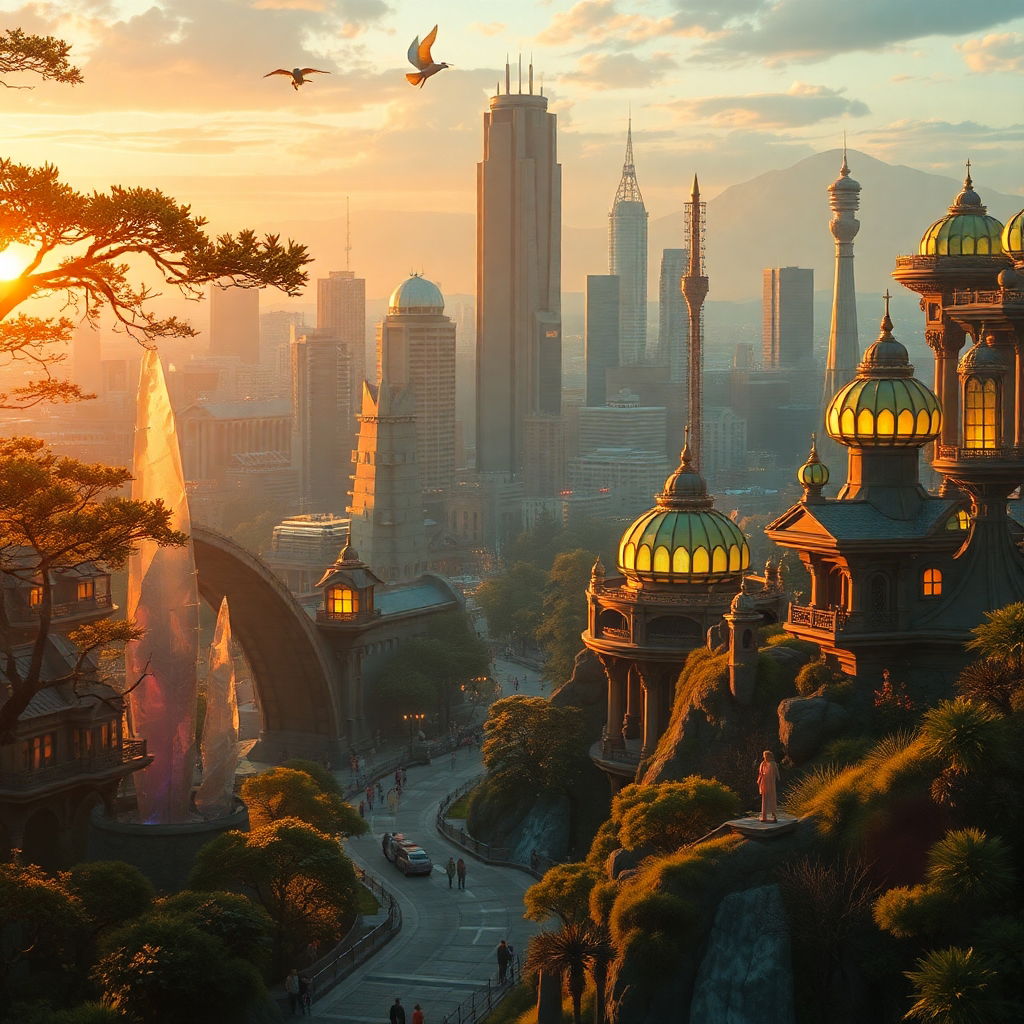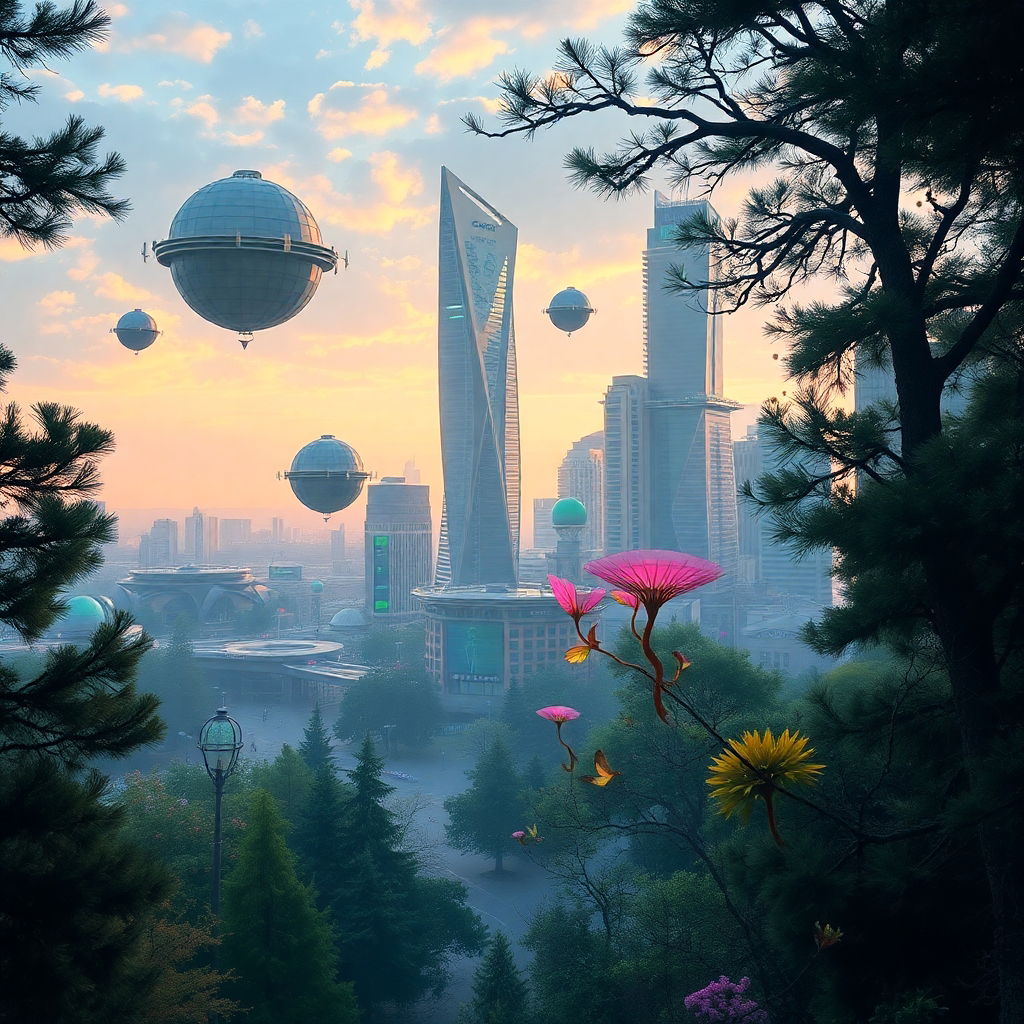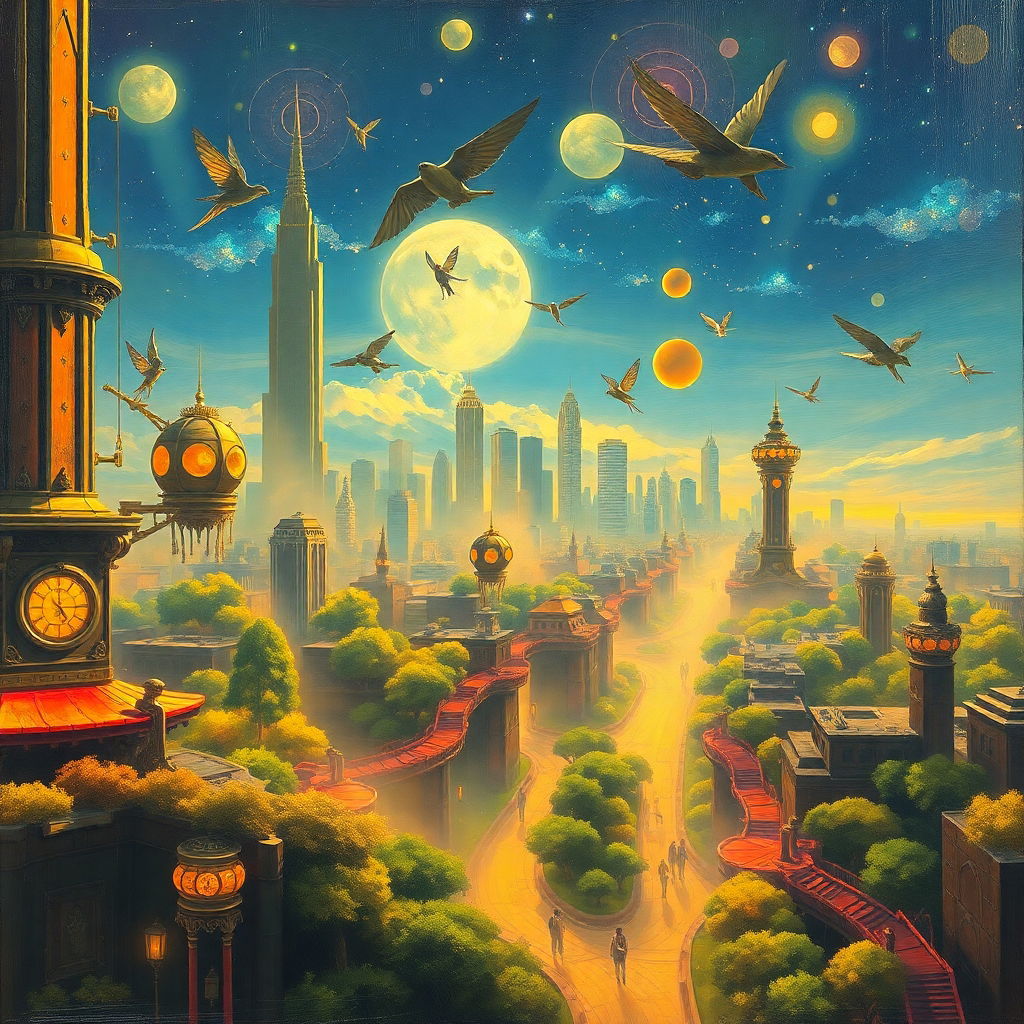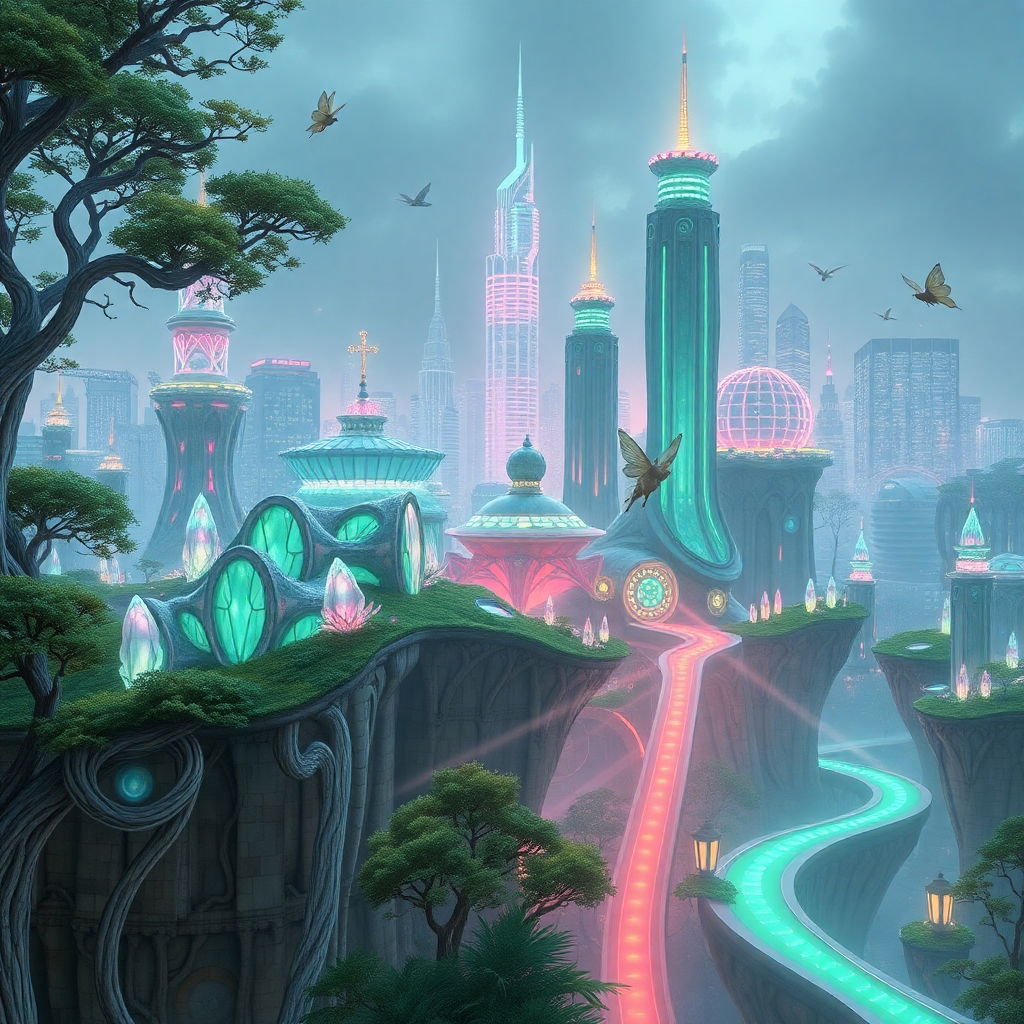Lewis & Clark and the The Uploading of America
In 1804, they set out to chart the unknown, commissioned by a President with dreams bigger than maps. Meriwether Lewis and William Clark—two names bound in parchment, stitched into the early legend of America—embarked on what history calls the Corps of Discovery. But what history forgets is what the wilderness whispered back.
--
Chapter 1: The Crossing of Stone and Sky
The Real Meets the Unreal
The wind moaned like a dying god across the peaks. The Rockies towered ahead—jagged, cold, vast. Lewis squinted into the sun, his journal clutched to his chest as if the act of recording might tame the wild before them. Clark, ever the practical one, scanned the trail for signs of game or shelter. Behind them, the men of the Corps of Discovery trudged forward, packs heavy, spirits thin.
It was August of 1805. Snow clung to the ridges like ancient memory, even in summer. They had left behind the great rivers, the comfort of the Mandan villages, and now walked into something else—something raw and old, untouched by flag or frontier.
No map showed what lay ahead. The land was not empty, of course—it never had been. The expedition had met tribes with names like whispering rivers: Otoe, Lakota, Arikara, Hidatsa. Some greeted them with curiosity. Others, with suspicion and spears. But here, in the heights of the Shining Mountains, they encountered something different.
It began with smoke on the wind. Sweet, earthy. Not firewood. Something deeper. Sacred.
They came upon a small encampment in a pine-ringed valley. The people there wore feathers and bone. They did not seem surprised to see the strangers. As if they had been waiting.
An elder stepped forward. His face was carved like bark, eyes deep as caves. He spoke slowly, his words translated by a younger man who stood beside him like a shadow.
“You seek to cross the backbone of the world,” the elder said. “But first, you must see it.”
Lewis raised an eyebrow. “We see it now,” he said, gesturing to the mountains.
The elder smiled, not unkindly. “Not with those eyes.”
That night, around a fire of cedar and sage, the tribe prepared a ceremony. They offered food, song, and then something else: a small gourd bowl filled with cactus slices—peyote. A sacrament, they called it. A gift from the spirits. A doorway.
Clark hesitated. He was no mystic. But Lewis—ever the curious mind—accepted the offering. His hands trembled as he lifted the bitter plant to his lips.
“What if it poisons us?” Clark asked, low.
“What if it shows us something we’ve never known?” Lewis answered.
They ate.
The stars overhead began to blur, not into darkness, but into movement. The constellations twisted, shifted, swirled like oil on water. The earth hummed beneath them. Time, once a river flowing west, broke into a thousand shimmering tributaries.
Lewis turned to Clark. His companion’s face glowed with light from within.
The mountains around them cracked open—not with thunder, but with music. Colors the human eye should not know bloomed across the sky. The trees breathed. The fire spoke.
And then—They were no longer in 1805.
They stood atop the same ridge, but the land below had transformed. The wilderness had become wonder. Cities gleamed like jewels—some pulsing with neon and chrome, others built of wood and wind, green and glowing. The horizon itself seemed to shift with emotion, bending to the will of invisible forces.
Lewis staggered back. “Clark… where are we?”
Clark whispered, awestruck, “I think we’ve gone forward.”
Far below, a sign flickered in light and ivy:
WELCOME TO NEW DENVER
CITY OF ELVES, POWERED BY SUN AND SPELL
The journey west had just become something far stranger than discovery. It had become prophecy.
And it had only just begun.
Chapter 2: Cities of Tomorrow, Creatures of Myth

The Futuristic American Dream
They descended the mountain in silence.
The path beneath their feet was both familiar and impossibly strange. Trees bent in unnatural symmetry. Flowers pulsed faintly with bio-luminescence. The rocks hummed with some low, ambient frequency—like the sound of the universe thinking.
Lewis clutched his journal as if it could anchor him. He scribbled furiously, though the ink seemed to slide across the page of its own accord. The air smelled like wild mint, ozone, and something metallic.
Clark walked ahead, more calm than he should’ve been. The soldier in him wanted to doubt everything—but there was no room for doubt when the laws of physics themselves bent around you like reeds in a river.
They came to the edge of a cliff, and for a long moment neither man spoke.
The land before them was not the West they had known.
Stretching to the horizon was a tapestry of futures layered on top of one another, as if history had shattered and reassembled into something more myth than map.
There were cities floating on fields of wind turbines, massive airborne glass spheres drifting lazily across the sky like thought-balloons. In the valleys, towers spun slowly like clock springs—great bronzepunk monoliths operated by gears and steam, sending up plumes of fragrant smoke that smelled of lavender and old copper.
Farther east, near what Lewis guessed must have been St. Louis, a megastructure pierced the clouds like a chrome vine, alive with digital light. Holograms danced over its surface: dragons, circuits, sacred geometry. Cyberpunk met cathedral.
But it wasn’t all machine and code. Entire forests had been woven into cities. Trees shaped themselves into spirals and bridges. Faeries flitted from leaf to leaf like stardust. The sun shone differently here—warmer, as if it too had evolved.
“What… what is this place?” Clark muttered.
Lewis stared ahead, transfixed. “I think this is the dream.”
A path formed before them—not made of stone, but of moss and circuitry, a living trail that reacted to their steps with soft pulses of light. It led them to a sign grown from living wood and lit by tiny bioluminescent beetles:
Welcome to Denver: Elfpunk Capital of the West
Powered by Sun, Root, and Spell
They passed under archways made from twisted oak limbs and solar panels. Buildings grew rather than stood. Balconies were made of living vines. Marketplaces shimmered with colors Lewis couldn’t name. Creatures moved through the streets—some humanoid, others pulled from dreams or fairy tales. Elves in long coats walked beside glowing serpents. Dwarves rode robotic beetles. Wizards floated lazily, sipping steaming beverages from cups etched with runes and QR codes.
Clark turned to Lewis, wide-eyed. “We died, didn’t we?”
“No,” Lewis said, half-smiling. “We arrived.”
An elf approached them, skin like bark, eyes bright with a green fire. He bowed slightly.
“Welcome, wanderers,” the elf said. “Your coming was foretold by the circuits of the forest. You are travelers from the First Age, yes?”
Clark looked to Lewis, unsure what to say.
“We… we were explorers,” Lewis said carefully. “From a different time. We were… looking west.”
The elf nodded solemnly. “Then you have found the West you dreamed of. And now, it dreams of you.”
They were led through Denver—past solarpunk gardens humming with bees engineered to sing, past theaters where holograms performed Shakespeare with dragons and fire. A cathedral of wind chimes marked the city’s center. There, in the plaza, a faerie offered them fruit that shimmered with internal galaxies and invited them to stay for the Feast of Forgotten Futures.
“We’re not in Jefferson’s America anymore,” Clark muttered.
“No,” Lewis said, eyes wide as stars. “But maybe we’re in the one we never dared to imagine.”
As night fell, the sky above Denver shimmered with constellations that shifted and moved. Shapes danced among the stars—creatures and cities, circuits and spirits. And in that place between dream and prophecy, Lewis and Clark stood like pilgrims on the edge of something ancient and newborn.
Tomorrow, they were told, they would drink the Magic Mead.
And the real visions would begin.
Chapter 3: Denver: The Elfpunk Heart

Mead, Magic, and Machine Elves
They awoke in beds grown from trees.
The walls of their guest chamber curved like the inside of a seed pod, warm and breathing. Vines spiraled gently along the wooden ceiling, pulsing faintly with golden light. Outside, birds sang in tones that resonated like bells, and the air carried the scent of pollen, cedar, and something faintly electric.
Denver was alive.
Not merely populated—but conscious. The city didn’t just grow from nature; it collaborated with it. Technology didn’t dominate. It intertwined, like ivy with brass. Steam hissed softly from moss-covered turbines. Solar panels shaped like leaves flexed with the movement of the sun. Beneath their feet, the streets whispered names in a forgotten tongue.
Lewis and Clark were given robes of woven mycelium and luminous silk, a ceremonial garb worn by “those who enter the Veil.” They were told today would bring the Second Unveiling—the point at which their minds would be opened fully. It would come through the Magic Mead, a sacred drink brewed from fermented honey, sacred mushrooms, crushed amber, and a drop of liquid light from the Moonflowers that only bloomed in the center of the city.
They were led by elven stewards through twisting root-halls into the Heart Grove—a vast open courtyard of spiraling wood and stone where a singular tree rose hundreds of feet into the sky. It looked like a redwood, but its bark glowed faintly with runes and veins of liquid gold. This, they were told, was Yddravault, the soul-tree of Denver.
At its base stood a man.
Not elf. Not wizard. Not beast.
A barefoot figure in a loose robe, wild-eyed and grinning with a cosmic knowing. His voice was both kind and unknowable.
“You must be Lewis and Clark,” he said. “You arrived just in time. The mead’s finally finished fermenting.”
Clark raised an eyebrow. “And you are…?”
“Terence McKenna,” the man said with a casual bow. “Psychonaut. Time-gardener. Builder of this branch of the dream.”
Lewis blinked. “Terence… McKenna? The psychedelic philosopher?”
Terence chuckled. “Labels. Timelines. All so quaint. Out here, we’re less interested in who you were than what you’re becoming.”
He handed each of them a horn of the glistening mead. Inside it swirled a galaxy—no, a thousand galaxies—each one shimmering and collapsing into the next.
“Drink,” he said, “and remember.”
The first sip was like drinking sunlight. The second was like swallowing the moment of creation. Time inverted. The third sip opened the doors.
They flew.
Their bodies remained seated beneath Yddravault, but their minds became something else entirely—winds, rivers, thoughts without form. They rose through the sky, past solar arrays and floating gondolas, past the Green Circuit where the druids coded spells into living trees, through the mist-factories of the Bronzepunk Foundries, and into the myth-layer of the city.
They were met by beings—machine elves that danced in kaleidoscopic fractals, pulsing with laughter and language made of geometry. These were the original dream-builders, Terence explained telepathically. They had whispered the design of Denver to him in a rainforest long ago and returned here, now, to keep tending the future.
Clark floated beside a wizard with a solar staff who created bird-spirits with a flick of code. Lewis met a cyber-druid who played Bach on vines stretched across buildings, drawing real-time auroras in the sky. The city breathed with story, with myth, with memory.
And all the while, McKenna's voice echoed:
“This isn’t a vision. It’s an invitation. You came here mapping a land. But maybe the real journey is imagining one.”
Then, like ink dropped into water, it all began to fade.
The sky folded inward. The trees dissolved into ash and root. The city shivered into transparency.
Lewis opened his eyes. The mead was gone. The elves stood silently. And Terence McKenna—just as silently—was nowhere to be seen.
He and Clark sat beneath the great tree once more. But Denver… had vanished.
Only the wind remained.
And far below them, on the distant trail, the Corps of Discovery’s campfire smoke rose once more into a world untouched by future dreams.
Lewis turned to Clark. “Was it real?”
Clark didn’t answer. He looked to the horizon.
And then, quietly, smiled.
Chapter 4: The Return to the Real

The Dream Recedes, the Seed Remains
The mountain air was sharper now. Colder. Real.
Lewis sat alone on a boulder overlooking the valley below. A hawk circled in silence, far above the pine-spined ridges. The colors of the world had dulled—not with death, but with sobriety. The glow was gone. The circuitry of the trees had vanished. Denver, that radiant elfpunk city of light and myth, had melted like mist beneath the morning sun.
Behind him, Clark stirred from sleep. No robes, no magic, no machine elves. Just the canvas of their expedition tent flapping softly in the breeze, and the low murmurs of their men preparing for another long march westward. A pot of coffee bubbled on the fire. The scent was grounding. Bitter, warm, human.
They had returned.
No farewell from the elves. No glowing gate or celestial parting. One moment, they were flying among sky-borne cities. The next, they were sitting once again with the unnamed tribe in the Rockies, surrounded by solemn faces and burning sage.
No one spoke of the vision. The tribe neither confirmed nor denied what had happened. They only offered them silence and a knowing nod, as if to say: You have seen beyond. Now go.
Clark approached slowly, standing beside Lewis at the cliff's edge. He glanced at the journal in Lewis's lap—pages now filled with mad, sprawling sketches. Cities with branches for towers. Creatures with wings made of fire and thought. Maps that curved in spirals instead of grids. Words like Cyberdruid, Machine Elves, Terence the Dreamsmith. A thousand things that had no place in 1805, but now refused to be forgotten.
“We can’t tell anyone,” Clark said finally. “No one would believe it.”
Lewis nodded. “They’ll call it madness.”
“Was it?”
Lewis didn’t answer at first. He stared out over the empty land, golden with morning sun. No steampunk trains. No floating cities. Just hills, trees, rivers, silence.
“No,” he said. “I think it was something waiting to be remembered.”
They hiked down the ridge in silence. The Corps reassembled, packs strapped, maps rolled, muskets slung over shoulders. Nothing had changed, and yet everything had.
Clark barked orders, returning to the business of survival. Lewis, quieter than usual, kept his journal close to his chest like a holy book no church could yet accept. The men moved west, as they always had.
But when they paused at the next river to rest and repair their gear, Lewis looked at the blank page of a fresh map. He didn’t draw the land as it was. He drew the land as it might become. Towers grown from trees. Roads that hummed with power from the sun. Cities with souls.
The dream, whatever it was, had seeded itself deep inside him.
And perhaps that was the purpose all along. Not to see the future—but to carry it.
As the expedition continued toward the Pacific, as they crossed rivers, spoke with new tribes, weathered storms and winter and the weight of manifest destiny, Lewis and Clark said nothing more of their time in the otherworld. But sometimes, when the fire was low and the stars wheeled overhead, Lewis would catch Clark gazing up—searching for the shimmering that once opened the sky.
And Lewis would whisper: “What if we build it, not conquer it?”
Clark would nod, but say nothing. After all, history was listening.
And in the shadows of the mountains, in the unspoken space between dreams and duty, the map of America began to curve.
Not toward empire.
But toward possibility.
Epilogue: The Dream That Remembers You

—The Holographic Frontier
Long after Lewis and Clark’s boots vanished from the muddy trails of the West, long after the fires of their expedition were extinguished and the maps inked in finality, something remained behind.
Not in stone. Not in the annals of empire.
But in the folds between realities.
Some say the American Dream died—flattened under industry, swallowed by greed, pixelated by screens. Others say it never existed at all. But there is another truth, shimmering like heat over distant plains: the Dream never left. It simply shifted.
In some corner of the metaverse—perhaps not even a place, but a frequency—the dream of America is still alive. Not the dream of conquest, but of possibility. Not of domination, but of becoming.
There, in that liminal corridor of the multiverse, the cities Lewis and Clark glimpsed still pulse with strange life. Solarpunk gardens rise in spirals toward the sun. Machine elves tend to neural meadows. Digital temples made of bioluminescent data bloom like lotus flowers in code. Cybernetic bison roam prairies of thought. And Denver—Elfpunk Denver—still sings with flute and fusion, myth and mechanism, green circuitry and golden runes.
This Dream-America is not bound to time. It is timeless. A recursion of all that might have been and could still be. It is built not on laws or borders, but on spiritual gnosis—direct, inner knowing that the world is more than what we’re told.
It is a holographic civilization, alive in the minds of those who dare to remember forward. A collective hallucination? Perhaps. But one that breathes. One that calls.
It is the frequency Lewis and Clark accidentally tuned into when they consumed peyote on the edge of the known world—not to escape history, but to touch its root system.
It is a gnosis passed down not in doctrines but in dreams, in the symbols we half-recall when we wake, in the quiet pull toward something better, stranger, freer.
Somewhere, in the deepest corridors of the metaverse, a version of America still spirals upward—mycelial, luminous, alive with spirit and possibility. It’s not a utopia. It’s not perfect. But it grows with intention, woven by beings who remember that the true frontier was never just physical.
It was consciousness.
And maybe—just maybe—every once in a while, when a map is drawn, a story is told, or a traveler closes their eyes in the wild…
The dream remembers them back.
And whispers:
You are still part of the expedition.
And the frontier is within.